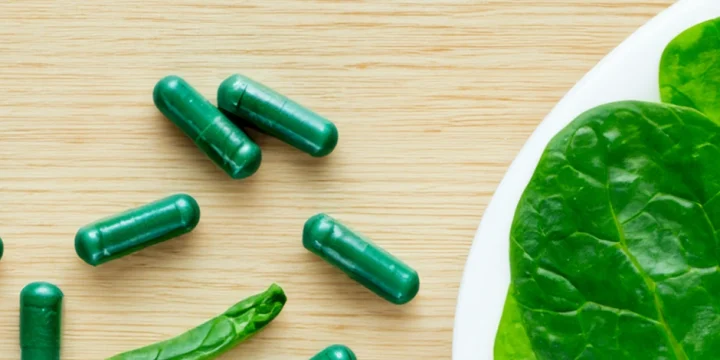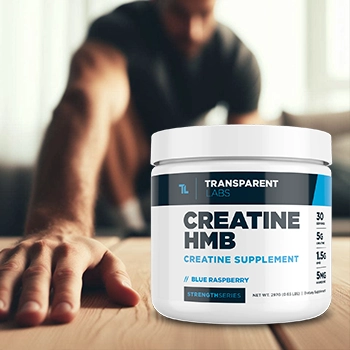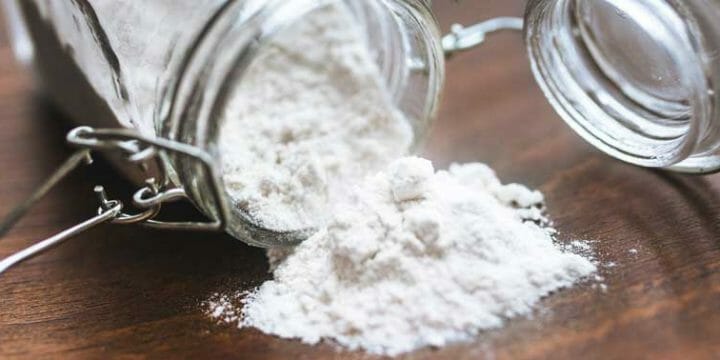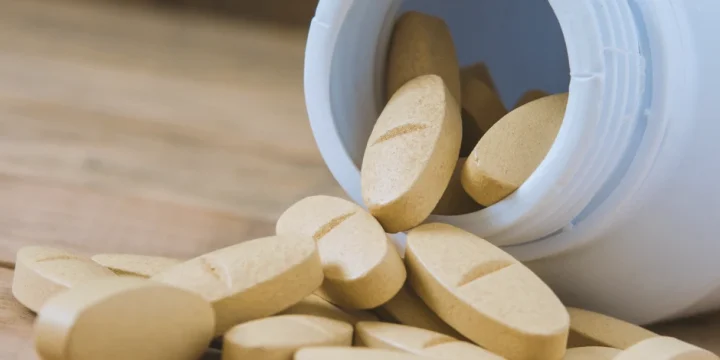 36
36
Considered
 155
155
of Research
 86
86
Examined
 11
11
Interviewed
When it comes to supplements, creatine has become one of the ‘must have’ of all supplement regimes.
In this article, we are going to tell you all about creatine - what it is, how it works, and how you can benefit from taking it.
We'll also review the top products we recommend worth checking out.
Find everything you need to know on creatine supplements in one easy-to-read piece and why it’s an imperative supplement crucial to your muscle gains!
The Best Creatine Supplements
- Best Overall Creatine Supplement: Transparent Labs Creatine HMB
- Cheapest Creatine Supplement: BulkSupplements Creatine Monohydrate
- Best Pre-Workout Creatine Supplement: Optimum Nutrition Micronized Creatine Powder
- Best Tasting Creatine Supplement: MuscleTech 100% Platinum Creatine
- Best Pure Creatine Powder: Optimum Nutrition Micronized Creatine Powder
- Best Unflavored Creatine Powder: Transparent Labs Creatine HMB
- Best Post-Workout Creatine Powder: Optimum Nutrition Micronized Creatine Powder
- Best Creatine Supplement for Muscle Growth: MuscleTech 100% Platinum Creatine
- Best Vegan Creatine Supplement: BulkSupplements Creatine Monohydrate
- Best Gluten-Free Creatine Supplement: Transparent Labs Creatine HMB
- Best Fast-Absorbing Creatine Powder: MuscleTech 100% Platinum Creatine
- Best Creatine Supplement for Bodybuilding: BulkSupplements Creatine Monohydrate
Our Top Creatine Supplements (June 2025)
1 - Transparent Labs Creatine HMB (Best Overall)
What Transparent Labs has done here is combine two highly effective supplements in the form of creatine monohydrate and β-Hydroxy β-Methylbutyrate (just call it HMB). And this is not just an accident, but a decision made after assessing clinical trials.
The company has proven HMB to improve strength and muscle definition [1], while creatine monohydrate will speed up muscle growth and recovery.
Our test results confirm that it provides quite a significant energy boost and recovery times are often cut in half.
Pros and Cons
Pros
- Contains 5,000 mg of creatine monohydrate
- Added 2,000 mg of β-Hydroxy β-Methylbutyrate (HMB)
- Gluten-free and non GMO certified
- No artificial sweeteners, coloring or preservatives
Cons
- Only available in unflavored and Blue Raspberry
This is our #1 recommended creatine supplement to help build your strength and muscles.
Get 10% off using coupon code: TOTALSHAPE
2 - MuscleTech 100% Platinum Creatine (Best Tasting)
Based on our tests, MuscleTech 100% Platinum Creatine contains pure creatine monohydrate, which helps to quickly improve your muscle cells' ability to restore ATP (adenosine triphosphate), the primary source of anaerobic energy. Higher ATP levels will give you the strength to train harder and recover faster.
One clinical study shows that the test subjects who consumed Platinum 100% Creatine Powder gained 6 pounds of muscle in 6 weeks.
Another study has proven that test subjects improved their bench press strength by 18.6% in just 10 days.
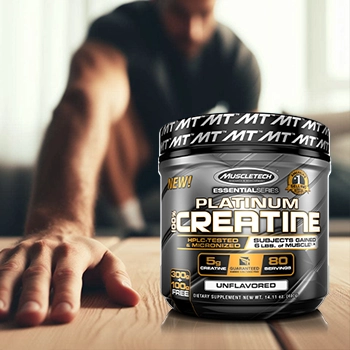
Pros and Cons
Pros
- Made from 100% Creatine Monohydrate Powder
- Provides high-intensity energy for pumped up workouts
- Results are proven based on clinical studies
- Fast absorbing supplement
- Great tasting and mixes easily with any liquid
Cons
- Caused slight headaches for some
3 - Optimum Nutrition Micronized Creatine Powder (Best Pre & Post-Workout)
This product is made with Creapure Creatine, a creatine monohydrate known for its extraordinary purity and potency. The powder is micronized, and after testing it, I realized it mixes well and stays in liquid longer than other brands.
Like other creatine supplements on this list, it is known to help increase muscle strength, improve performance, especially in high-intensive exercise, and increase energy reserves while lessening protein breakdown.
This product is ideal when taken before and after a workout.
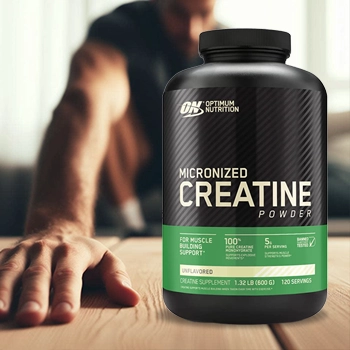
Pros and Cons
Pros
- Pure creatine monohydrate powder
- Helps speed up muscle growth and recovery
- Recommended to be taken before or after workout
- Affordable
Cons
- Might cause upset stomach
Optimum’s Micronized Creatine Powder is available in different sizes.
4 - BulkSupplements Creatine Monohydrate (Cheapest & Best Vegan)
If you want to experience high-intensive workouts at the gym, you might want to try BulkSupplements Creatine Monohydrate Powder. This product is made to help give you the stamina you will need for bodybuilding, intense CrossFit, and any strength training workouts.
By taking creatine supplements like this one along with a healthy diet and regular workouts, you will experience favorable muscle growth and increased overall performance in workouts.
I took this supplement for several weeks and noticed different benefits regarding muscle growth and overall faster recovery.
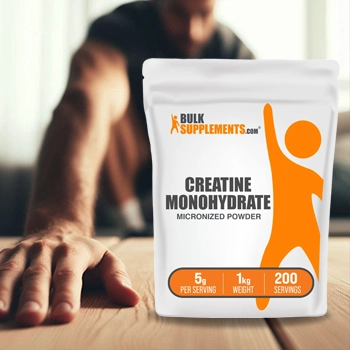
Pros and Cons
Pros
- Made from 99% micronized creatine monohydrate
- Helps build lean muscle mass and recovers it for the next workout
- Gluten-free and vegan-friendly
Cons
- There are other creatine supplements with higher creatine content
This powdered creatine is made from 99.99% micronized creatine monohydrate that is sugar, yeast, and gluten-free, suited for those who are vegan-friendly.
How We Tested Creatine Supplements
Selecting the best creatine supplements isn't just about reading labels and comparing prices. It's about understanding the science, ensuring quality, and verifying the claims made by manufacturers.
Here's a glimpse into our rigorous testing process:
- Ingredient Analysis: We started by examining the ingredient list of each product. Pure creatine monohydrate without unnecessary fillers was our primary focus.
- Purity and Quality: We sent samples to third-party labs to verify the purity of the creatine. This ensured that what's on the label is what's in the bottle.
- Solubility and Mixability: A good creatine supplement should dissolve easily in water or juice. We tested how well each product mixed in various liquids.
- Taste and Texture: While unflavored creatine is tasteless, any added flavors or ingredients can affect the taste. Our team conducted blind taste tests to rate each product.
- Effectiveness: While it's hard to measure the immediate impact of creatine, we gathered feedback from users over a period of weeks to gauge any noticeable differences in performance and recovery.
- Value for Money: We compared the cost per serving, the quality, and the overall benefits to determine which products offered the best value.
Our goal was to provide you with a list of creatine supplements that are not only effective but also trustworthy and reliable. We hope our research and testing methods give you confidence in our recommendations.
Buyer's Guide
Navigating the vast world of creatine supplements can be daunting. With countless brands and formulations available, making an informed decision is crucial. This buyer's guide aims to equip you with the knowledge to choose the right creatine supplement for your needs.
Type of Creatine
Here are the most notable creatine types to consider:
- Creatine Monohydrate: The most researched and widely used form. It's known for its effectiveness and affordability.
- Creatine Hydrochloride (HCl): Claims to be more soluble than monohydrate and may cause fewer digestive issues for some.
- Buffered Creatine: Allegedly has a higher pH level, which might lead to better absorption.
- Liquid Creatine: While convenient, some argue that creatine may break down in liquid over time.
Tip: For most people, creatine monohydrate is sufficient and offers the best value.
Purity
Look for products labeled as "100% pure creatine" or "no fillers." This ensures you're getting a high-quality product without unnecessary additives.
Micronized vs. Non-Micronized
Micronized creatine has been processed to reduce the particle size, leading to better solubility and absorption. It's often a preferred choice for those who experience digestive discomfort with regular creatine.
Flavored vs. Unflavored
While unflavored creatine is versatile and can be mixed with any drink, flavored options can make the consumption experience more pleasant. However, be wary of artificial sweeteners or additives.
Price and Brand Reputation
While creatine is generally affordable, prices can vary. Opt for reputable brands known for quality and transparency. Reading user reviews and third-party testing results can be insightful.
Certifications
Look for certifications like "Informed Choice" or "NSF Certified for Sport." These indicate the product has been tested for banned substances and meets high-quality standards.
Serving Size and Packaging
Consider how you'll be using the supplement. If you travel often, single-serving packets might be convenient. On the other hand, bulk powders offer better value for regular users.
Potential Allergens
Always check the label for allergen information, especially if you have sensitivities or allergies. Some creatine supplements might be processed in facilities that handle allergens like gluten, dairy, or nuts.
Return Policy and Guarantee
A company that stands by its product will often offer a satisfaction guarantee or a robust return policy. This can be reassuring when trying a new supplement.
Consultation
Always consult with a healthcare professional or nutritionist before starting any supplementation, especially if you have underlying health conditions or are on medication.
What Is Creatine?
Creatine is a protein-like compound found naturally in muscle cells to produce energy during weight lifting or high-intensity training. It's a very popular supplement to take for muscle gain, enhanced strength, and improved physical performance.
Creatine is also often referred to as creatine phosphate because once it reaches your muscle cells, a high-energy phosphate attaches to it. Thus, it brings about the chemical name of phosphocreatine (PCr) or simply creatine phosphate [1].
It has been theorized that supplementing with creatine can lead to an increase in PCr in muscle by as much as 20%.
It can be found and sourced in high abundance from fresh meats and fish. It is synthesized in your body, largely in your liver, from the three amino acids, arginine, methionine and glycine.
Your muscle tissues need to source creatine from your bloodstream; therefore you must ingest potent forms of creatine for your body to use it.
Creatine supplements are most popular for their ability to help with:
- Mass gain
- Sporting performance
- Endurance activity
- Weight lifting
- Powerlifting
- And much more!
How Does Creatine Work?

Creatine works by improving strength and allowing the human body to perform muscular strength-based exercises successfully.
See, the body actually has its own natural store of creatine readily available.
It’s a naturally occurring substance within the muscle cells of the body that lead to us being able to perform explosive, singular feats of strength (or in the case of traditional resistance training, sequences of singular exercises).
This is due to a chemical reaction, whereas Cr (the body’s free creatine stores) bond with the stored version of creatine (known as creatine phosphate, found in the muscle cells) to allow the body to create a muscular contraction when combined with ATP (adenosine triphosphate) and ADP (adenosine Diphosphate).
Basically, it is an important component that’s absolutely vital for lifting weights, especially at high levels of intensity. I used creatine for over 5 years already, and I will probably never stop using it because of how much stronger and better I feel during my workouts.

Any Side Effects?

There are no side effects if you use creatine properly. Moreover, we haven't found any published literature suggesting it is unsafe. I personally didn't experience any side effects from using creatine.
It's a naturally occurring compound found within the human body, so if it isn't safe, we'd better all set out to start extracting it from within our muscle cells immediately!
You could instead take solace because it's clearly not only very safe but also very compatible with the human body. After all, the body couldn't function without it.
So There Are No Risks At All?
Any risk from creatine supplements could potentially come about from excess loading of the product, i.e., completely ignoring the recommended serving suggestions on the packaging of your chosen creatine brand. It's generally considered right up there among the safest, along with mass gainers and whey protein.
Risk would come in the form of excess stress on the kidneys and liver due to having to process more than the “normal” amount of the compound, but with that said, there is absolutely nothing at all that is ever safe in excess - even water.
Diarrhea is also a reported side effect reported by some users, but it’s not often this will occur if dosage instructions are followed.
Simply put, it’s absolutely fine provided you don’t decide to take an entire tub at once in the pursuit of world-class level strong man style strength. In truth, at worst - you’ll probably just find yourself urinating more than normal. On that note, it only really works if you’re very well hydrated - so drink plenty!
Related Post: Does Creatine Go Bad?
The 4 Types of Creatine
There are several different types of creatine available, all of which claim to produce roughly the same end result, in that they lead to enhanced performance with resistance and strength based exercises.
There are 4 types of creatine, which are:
- Creatine monohydrate - The most common variety of variety, in truth, is probably the most effective (in terms of proven results). It comes in powdered form, mixes with water and on the whole seems to respond well with most users (in that it provides positive results. [2])
- Micronized creatine - This is another form that is essentially a condensed form of creatine monohydrate. It supposedly absorbs more readily which leads to less risk of water retention under the surface of the skin (a negative side effect that some monohydrate users experience). It’s slightly more expensive than the much cheaper monohydrate, but considering for many people, the difference will be unnoticeable
- Creatine ethyl ester - Another popular choice. The great feature about this form is that the ester attached to the creatine molecules creates a highly positively charged absorption rate of almost 99%. It is guaranteed to directly infiltrate the muscles without any wastage. The bad news? It costs. You’ll be paying a lot extra for this super charged form.
- Creatine Kre-Alkalyn - It’s another form of creatine that has been bonded to an additional molecule for not only advanced absorption, but it also allegedly ensures that none of the molecules go to waste and are all in fact converted for their intended use once digested. So far, results have been positive for users, but sadly there have been no clinical trials to add some real substance to the claims. As you’d expect, it’s also super expensive.
What Are The Benefits?

The benefits of using creatine are improved athletic performance and increased muscle mass. With more creatine in your muscles, you are better equipped to perform more explosive movements such as sprinting, rowing, and weightlifting [3].
A study published in the Brazilian Journal of Clinical Medicine and Review has shown that supplementing your diet with roughly 20 grams of creatine monohydrate may elevate the total creatine content in your muscles by 10–20%, which is pretty significant really [4].
Creatine supplementation has been proven to be successful time and time again as long as you stick to regular usage.
Creatine Has Been Proven To Work…

It has also been suggested through sufficient evidence that ingestion of a carbohydrate source, for example tri-carb or dextrose with creatine supplements can effectively enhance intramuscular creatine uptake and glycogen.
Another great aspect of the positive effects of creatine is the fact that it is so adaptable – considering that explosive muscular power is the primary result that creatine delivers.
“The addition of creatine promoted greater mgains in fat/bone-free mass, isotonic lifting volume, and sprint performance during intense resistance/agility training.”
- Richard B. Kreider, Professor and Department Head, Health and Kinesiology
It can be applied for anything from powerlifting to mixed martial arts thus providing athletes all over the world with a readily accessible source to enhance their chosen sport.
It’s worth noting that explosive muscular power is used at varying intensities for almost every form of activity aside from aerobic exercise where the respiratory system is the primary fuel source.
As a result, you could experiment with creatine supplements for pretty much any form of exercise and it could enhance your performance drastically.
There aren’t many creatine supplements on the market today that can boast this level of adaptability for just about any form of physical endeavor; this is perhaps one of the main reasons why creatine has become so popular.
Related Article: Tobey Maguire Training and Diet Plan
What's The Recommended Dosage?
The recommended dosage varies greatly depending on the type being used. But in many cases, manufacturers recommend going through a “loading phase" before tapering off and taking a smaller dosage over a period of several weeks.
In truth? Have between 2.5 - 5 grams of creatine one hour before, and again immediately after training if you’re taking monohydrate.
You could also take any other form of creatine in this manner too without much detriment - as a rule of thumb this will suffice for most people without excessive waste during an often-unnecessary loading phase.
I always take 5 grams of creatine a day, and that yielded many positive effects and benefits for me, such as increased maximum strength, muscle growth, and shorter recovery time.
When Is The Best Time To Take Creatine?
The best time to take creatine is shortly before or after your workout. It may be better to take it with food on rest days, but the timing here is less important than on exercise days.
You can read the full article here: The Best Time to Take Creatine
Should I Take Creatine Supplements?
You should take creatine supplements if you perform resistance training and want to break into new strength territories or develop more size.
Stick with monohydrate, see how you progress, and if you experience any negative side effects or simply don’t see any results, then it might just be that you need a purer form to help guarantee more concrete results.
If none of them work, then at least you tried one of the most popular and proven supplements on offer and can now check it off the list.
It’s important to remember that anything capable of healthily and positively affecting the outcome of your training is always going to be a desirable addition to your arsenal.
Natural Sources: Where Can We Find Creatine in Our Diet?
While creatine supplements are a convenient way to boost phosphocreatine stores, several foods naturally contain creatine.
Red meats, like beef and lamb, and fish, especially herring and salmon, are rich sources.
However, to achieve the same amount of creatine found in supplements, one would have to consume large quantities of these foods, making supplementation a practical choice for many.
FAQ
When Is the Best Time to Take Creatine?
The best time to take creatine is before or after your workout. Taking it post-workout increases muscle recovery and growth. Taking it with a meal on rest days may be beneficial to maximize absorption.
How Do Creatine Supplements Support Muscle Growth?
Creatine supplements support muscle growth by increasing the phosphocreatine stores in your muscles. This improves exercise performance, especially during high-intensity, short-duration activities.
Our Verdict on Best Creatine Supplements
After spending a month on each of the creatine supplements above and keeping a very detailed training diary, I took a closer look at the numbers.
But the one I found that was the most favorable of all was Transparent Labs Creatine HMB. And this was also confirmed by online reviews and conversations with some friends and colleagues at the gym.
Adding the HMB seems to give it that little edge that will allow you to work harder without worrying about your performance levels the next day.
Our #1 Recommendation
Transparent Labs Creatine HMB (Best Overall)
- Contains 5,000 mg of creatine monohydrate
- Added 2,000 mg of β-Hydroxy β-Methylbutyrate (HMB)
- Gluten-free and non GMO certified
- No artificial sweeteners, coloring or preservatives
- Only available in unflavored and Blue Raspberry
About The Author
You May Also Like

